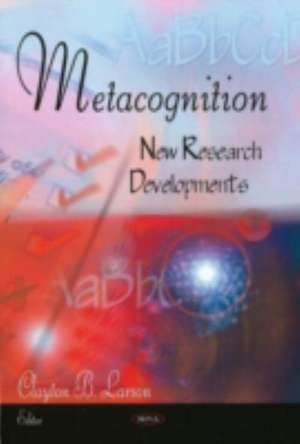Metacognition
Autor Clayton B. Larsonen Limba Engleză Hardback – 19 iul 2009
Preț: 655.34 lei
Preț vechi: 689.83 lei
-5% Nou
Puncte Express: 983
Preț estimativ în valută:
125.40€ • 131.28$ • 103.76£
125.40€ • 131.28$ • 103.76£
Carte disponibilă
Livrare economică 17-31 martie
Preluare comenzi: 021 569.72.76
Specificații
ISBN-13: 9781606927809
ISBN-10: 1606927809
Pagini: 281
Ilustrații: tables
Dimensiuni: 187 x 257 x 22 mm
Greutate: 0.84 kg
Editura: Nova Science Publishers Inc
ISBN-10: 1606927809
Pagini: 281
Ilustrații: tables
Dimensiuni: 187 x 257 x 22 mm
Greutate: 0.84 kg
Editura: Nova Science Publishers Inc
Cuprins
Table of Contents:; Preface; The Importance of Cultivating A Meta-Discourse in Deliberate Support of Metacognition; Metacognition in Animals; Clinical Reasoning Strategies and Related Research: Health Care Professional Perspectives; Metacognition and Metamovement: Links between Cognition and Motor Function in Parkinsons disease; Metacognition and Reactive/Regulative Aspects of Temperament in Obsessive-Compulsive Disorder; The Effect of Metamemory on Memory Performance: A Test of a Structural Model; Metacognition Awareness and Control in Comprehending Multimedia Presentations; Curiosity and Metacognition; Social Metacognition in Groups: Benefits, Difficulties, Learning and Teaching; The New Look in Metacognition: From Individual to Social, From Cognitiive to Affective; Using Structured and Open-Ended Procedures for Eliciting Data on Learners' Metacognitive Knowledge: A Qualitive Comparative Study; Metacognition: Teacher Knowledge, Misconceptions, and Judgment of Relevance; Metacognition and Professiona; Development of Secondary Education Science Teachers: a Case Study; The Improvement of Students Self-Regulatory Behavior in Mathematics: The Impact of Mathematical Modeling; Unawareness of Deficits in Alzheimers Disease through a Biopsychosocial Perspective; Metacognitive Knowledge About Intelligence: The Multiple Intelligence and Entity/Incremental Theories According to Naïve Conceptions; Introspection, Meditation and Metacognition: How aware or Unaware of Myself can I Be?; Index.















